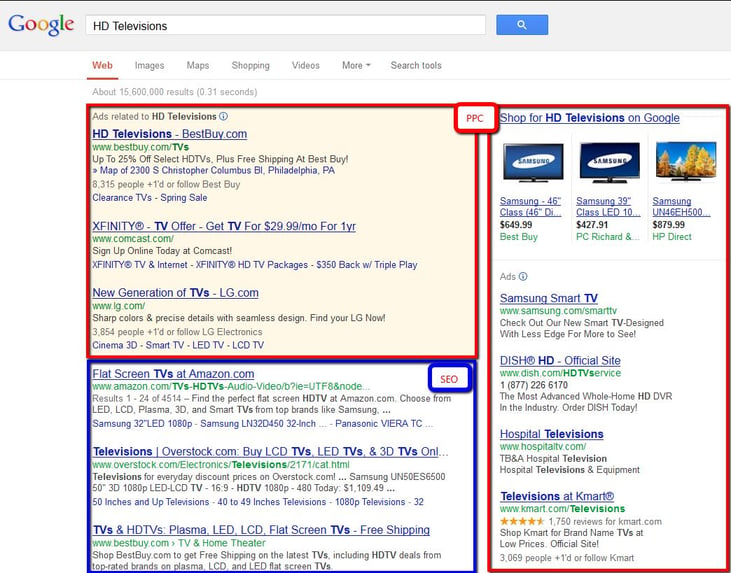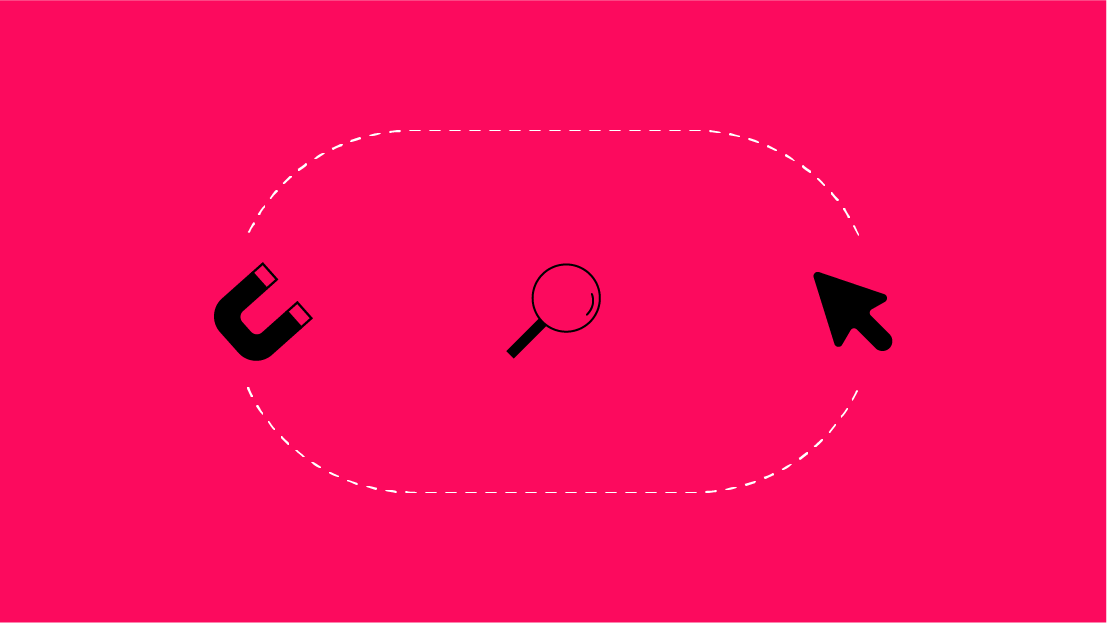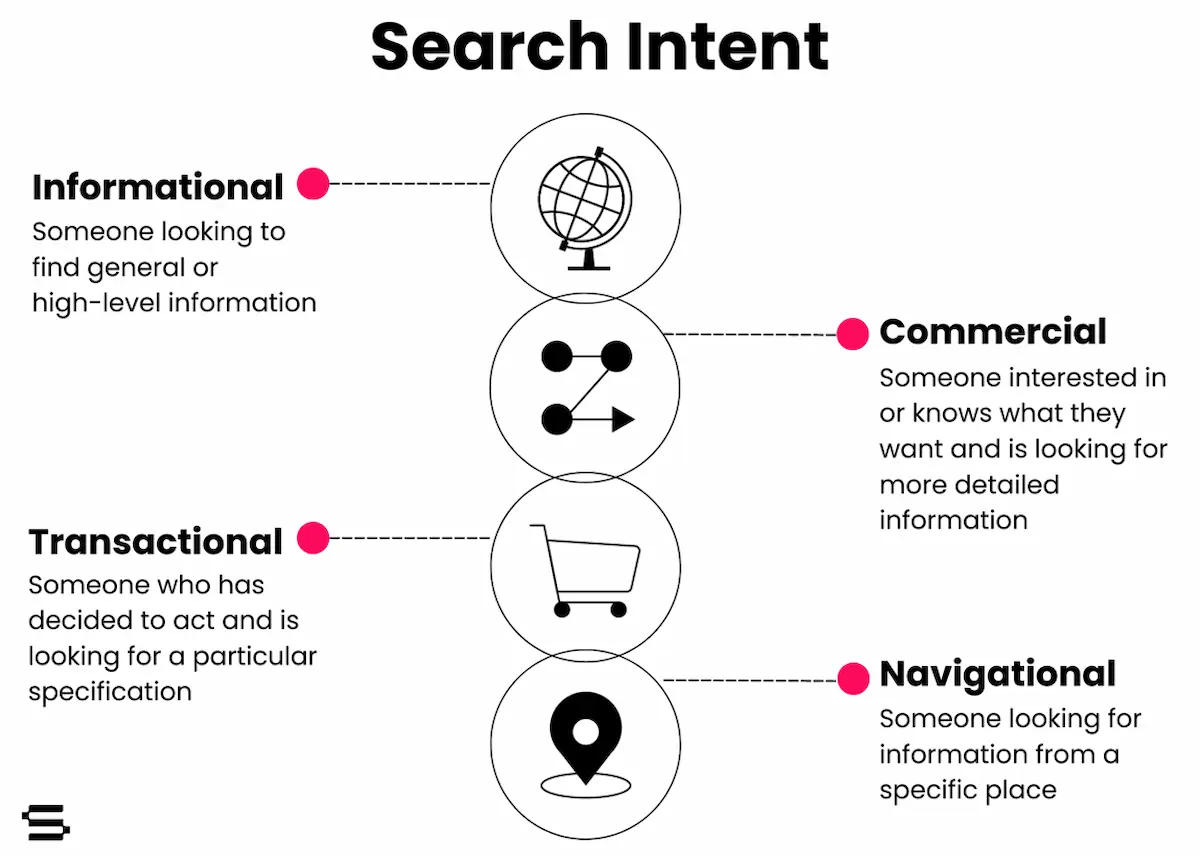As a digital marketing agency specializing in search, it shouldn’t surprise you to hear that we’re regularly asked what the difference is between PPC and SEO. So let’s run through each!

Pay-Per-Click (PPC):
PPC advertising, also known as “Paid Search” or “Search Engine Marketing (SEM)”, is the process of paying for advertising on sites and search engines but the advertiser is not charged unless someone clicks on an ad. Most often (but not always) PPC is an auction where you compete for position against other advertisers.
PPC can allow for much quicker wins in visibility or conversions for advertisers whereas SEO is a long term effort of building a community to help your organic presence. While it can take a long time to rank #1 organically on search engine results pages via SEO, advertisers can use PPC ads to appear above organic or SEO results, seen in red in the image above, within minutes of opening an advertising account.
Advertisers select keywords to bid on, which match to the search queries, or actual words users are searching for. Similar to SEO, content (in ads) and relevancy are significant factors in getting ads to show in the top position. Search engines like Google give each ad a quality score (1-10 basis) based off of numerous factors which they unfortunately won’t elaborate much on. That quality score is then multiplied by your bid to get an overall Ad Rank. In an auction setting like Google’s, an advertiser only ends up paying just a bit more than the one below them, after all Ad Ranks are evaluated. So the amount an advertiser bids is not necessarily what’s charged upon a click.
Why do advertisers pay for these ads when they can try to rank naturally for free?
- Real-estate on the search engine results pages is at a premium.
- Many users simply click on the first link of the results page, regardless of whether it’s an ad or an organic listing.
- The opportunity to generate conversions can be heightened when ads are prominently displayed.
- New market segments can be identified, based on what people are searching for, and ads can be shown where an advertiser’s site may not be able to rank naturally.
- Competitors are likely paying for ads or have the opportunity to, potentially winning new business or taking it from others.
Paid search also spans into other websites outside of popular search engine result pages like Google, Bing and Yahoo and types vary from text, to image, to video among others. The most important thing to remember is that ad relevancy to the searcher/web surfer is most important and will ultimately lead to the most efficient PPC campaigns, depending on an advertiser’s goals.
Search Engine Optimization (SEO):
SEO is about getting a website found and ranking high on search engine results pages. It is also often referred to as organic or natural search results, highlighted in blue above. When a searcher decides to click on these results there is no fee charged to that website.
The hard part is optimizing a site so that the search engines recognize it as highly qualified and relevant to the search query. This process can take time, and there’s no concrete answer for how to rank #1. While clicks on these links may be free, it can take an investment of time and money from a business to make the right optimizations to their site to produce the desired results.
It’s also important to remember that search engines are not real-time rankings; they’re an index of sites the engines have visited over time and they may only visit some sites every few days. A SEO manager's job is to understand what these search engines deem relevant and high quality in order to make savvy and efficient decisions which will increase natural rankings when a site is surveyed or crawled. In order for a website to rank higher, there are two main factors search engines consider: On-Page and Off-Page factors.
On-Page factors include everything on your website that help search engines find it. Among many other factors, these elements include:
- Keywords that are relevant to the things people are searching for.
- The site's architecture. For example: load time, internal linking structure, title tags, search friendly URLs, and others.
- Content on the pages relevant to the products and users. Content is KING!
Off-Page factors focuses on getting other sites to include a link/reference back to your website. This is seen as a vote of confidence in the eyes of the engines. Known as “Link Building” for SEOs, this process is best managed by building relationships and generating quality links vs. spamming links across the web. A few strategies for building links can be through guest blogging, sponsorships, discounts, infographics, building a resource or an asset.
It’s most important to remember that SEO takes time and unique, quality content is the best approach to building links.
Want to know more about how PPC and SEO are related? Fellow SEER Associate Audrey wrote a great post a while back on that very topic!


